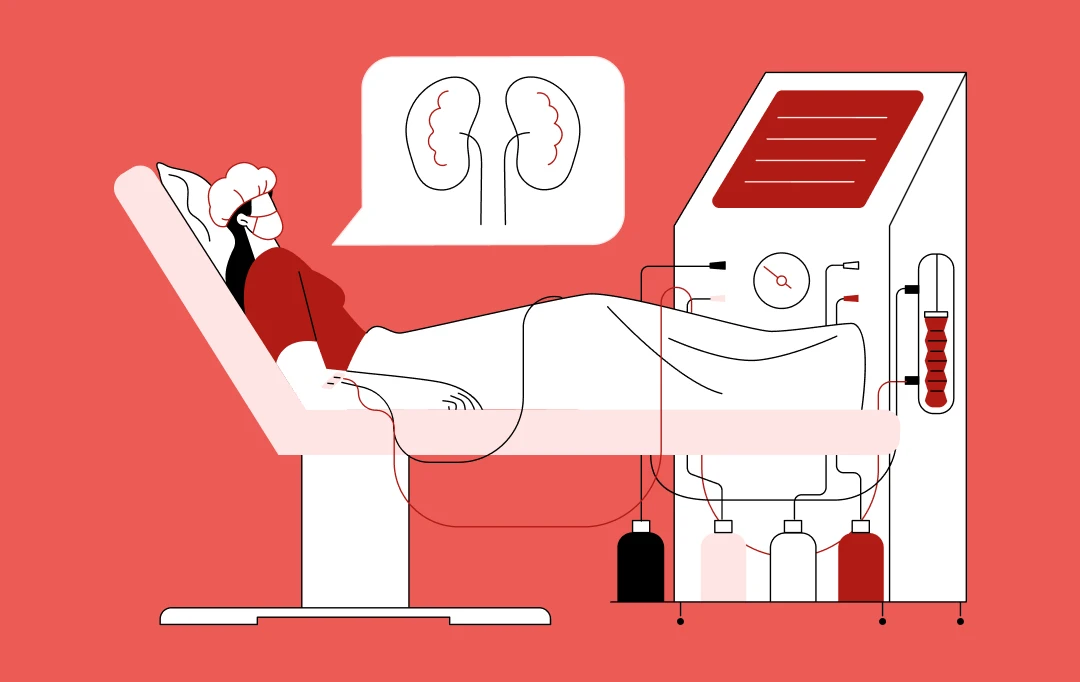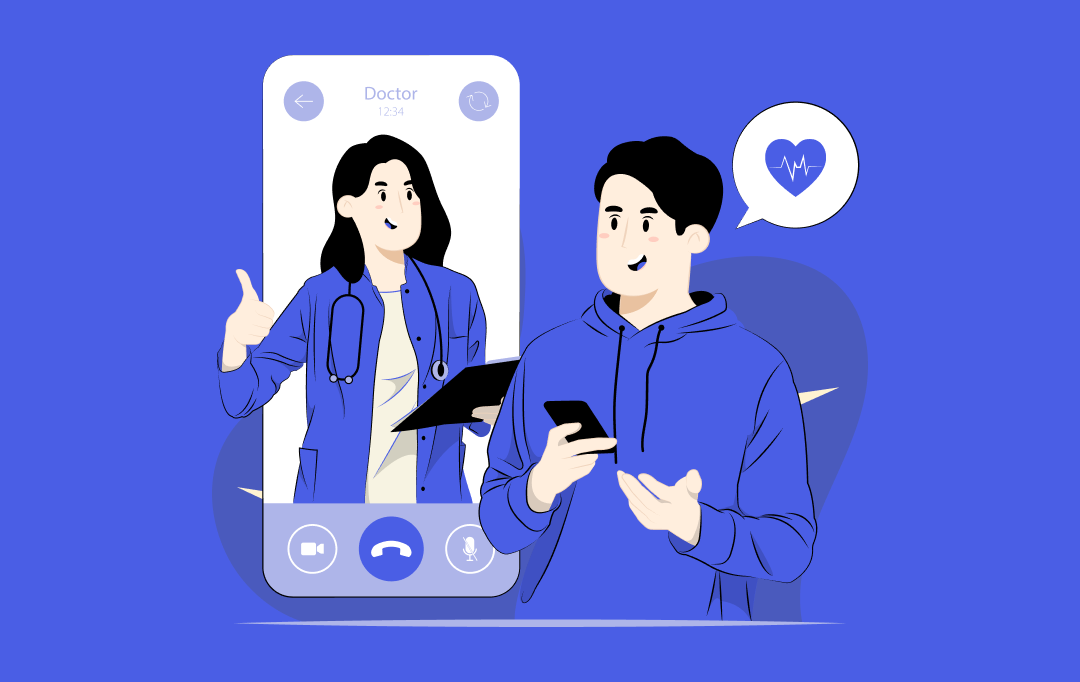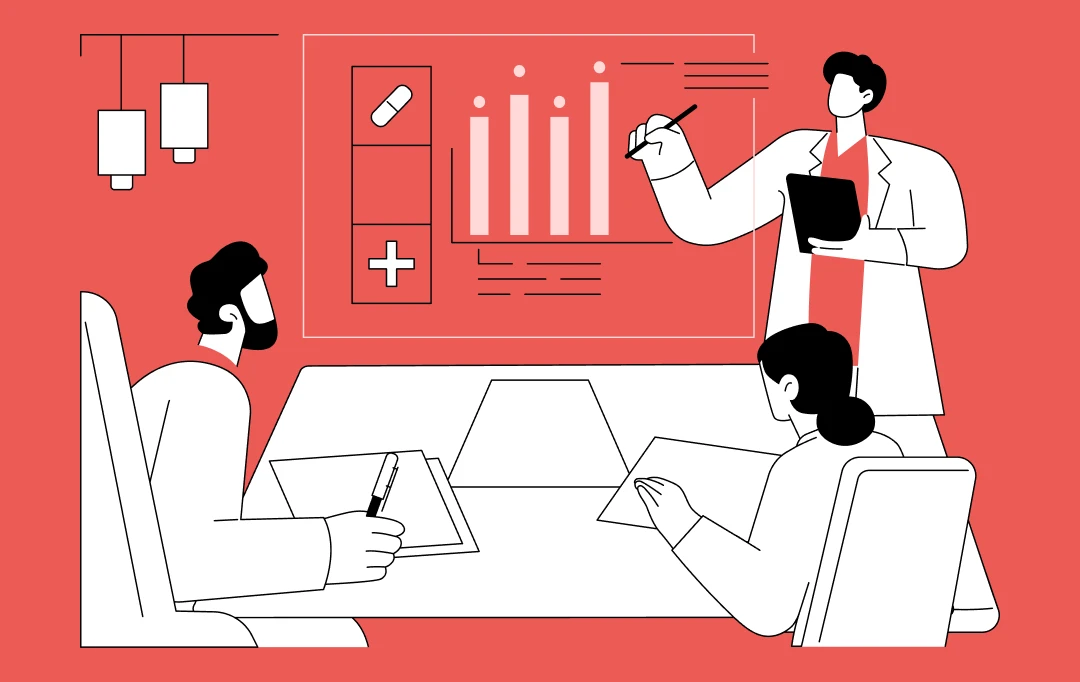- What Makes Patient Access a Trendsetter in the World of Healthcare App Development
- Factors Affecting Patient Access App Development Cost
- App Complexity and Features
- Platform Compatibility
- UI/UX Design
- Development Team Location
- Third-Party Integration
- Security and Compliance
- Essential Features of a Healthcare App like Patient Access
- User Authentication and Profile Creation
- Appointment Scheduling
- Prescription Management
- IoT-Enabled Remote Monitoring
- AI-Powered Health Insights
- Telemedicine and Virtual Visits
- Medical Records and Health Information
- Billing and Payments
- Analytics and Reporting
- Interoperability
- Geolocation
- Notifications and Alerts
- Patient Access-Like App Development Process
- How Do Apps Like Patient Access Make Money?
- Subscription Fees
- In-App Purchases
- Advertising Models
- Embark on Your Healthcare App Development Journey with Appinventiv
- FAQs
The digital health market is growing exponentially at a CAGR rate of 9.16% from 2024 to 2028. With this whopping growth, the healthcare app market is set to reach a projected revenue of $193.70 billion by 2024 and is expected to expand to a market volume of $275.00 billion by 2028.

This staggering growth is backed by the increased focus on improving health and fitness among the young generation, particularly after the COVID-19 pandemic. Also, the rising prevalence of chronic ailments worldwide, including hypertension, diabetes, respiratory conditions, and cardiovascular diseases, is supplementing the market volume. Furthermore, the increased use of IoT-connected smart devices and healthcare applications like Patient Access accelerates this market expansion.
This exponential growth presents a golden opportunity for entrepreneurs to tap into a highly profitable market. So, whether you are an entrepreneur wishing to break into this profitable market or a medical professional seeking to offer efficient patient care, developing a healthcare app like Patient Access (or something similar) is a smart decision. However, before you embark on your healthcare application project, it is essential to know the cost to develop a healthcare app like Patient Access
Typically, the cost to develop a healthcare app like Patient Access ranges between $30,000 and $300,000 or more. However, various crucial components (details later) can further increase or decrease this cost estimation.
In this guide, we will walk you through the landscape of healthcare application development, highlighting Patient Access like healthcare app development cost, factors, features, and development process.
What Makes Patient Access a Trendsetter in the World of Healthcare App Development
Patient Access is a revolutionary mHealth app connecting patients to local health services. Whether it is about booking GP appointments, discovering local health services, or ordering repeat prescriptions, Patient Access is an all-encompassing healthcare solution. With 1 million+ downloads on the Google Play Store and 4.8 ratings on the App Store, the app represents a significant advancement in the healthcare space, empowering patients with unprecedented control over their medical care.
By seamlessly bridging the gap between patients and healthcare providers, this innovative app offers a holistic solution to access medical records, communicate with healthcare professionals, and do a lot more—all from the convenience of a mobile device. With easy NHS login and instant access to patient’s health information, lab results, and repeat prescription details, the app allows patients to take charge of their healthcare journey.

With its intuitive interface, robust security measures, and advanced features, the Patient Access app not only enhances patient engagement and satisfaction but also promotes better health outcomes. As digital transformation in healthcare advances, apps like Patient Access stand as a revolutionary force, inspiring medical professionals to offer more efficient and patient-centric care.
Now that we know the modus operandi of a successful mHealth app like Patient Access, let’s evaluate the vital elements that influence healthcare app development costs.
Factors Affecting Patient Access App Development Cost
Developing a Patient Access app involves various factors that influence the healthcare app development costs. Here are some of the key elements to consider when estimating the cost to develop a healthcare app like Patient Access:

App Complexity and Features
Features and functionalities are the primary determinants of healthcare app development costs. A basic app with simple features, such as appointment booking, profile creation, etc., is less expensive to develop than a complex app. Incorporating advanced functionalities like telemedicine, integration with electronic health records (EHR), and AI-driven health monitoring substantially increases the development cost. Furthermore, incorporating AI chatbot in healthcare apps like Patient Access can also add to the overall expenses.
You may like reading: What Is the Cost to Develop a Healthcare Chatbot like Google’s AMIE?
| App Complexity | Average Duration | Cost Estimates |
|---|---|---|
| Simple app with basic features | 3-6 months | $50,000-$100,000 |
| Medium complex app with moderate features | 6-9 months | $100,000-$150,000 |
| Highly complex app with advanced features | 9+ months | $150,000-$300,000 |
Platform Compatibility
Platform and device support also play a crucial role in determining Patient Access like healthcare app development costs. Developing an app for a single platform, iOS or Android, is more cost-effective than creating a cross-platform solution that runs seamlessly on both platforms. However, cross-platform development frameworks like React Native or Flutter offer cost-saving solutions compared to developing separate native apps. Furthermore, ensuring compatibility with various devices, including smartphones and tablets, adds to the complexity and cost.
UI/UX Design
UI/UX is a critical element that enhances user engagement and cost. Crafting a basic design is more budget-friendly than creating a highly interactive and user-friendly design. An interactive and visually appealing UI/UX demands more resources and time, thereby increasing the overall healthcare app development cost.

Development Team Location
The geographical location and size of the medical app development company can significantly impact the cost. The size and location of the development team—whether freelancers, in-house developers, or an outsourced company—affect the budget. Also, the charges of healthcare app developers can vary dramatically around the world. For example, developers in the UK, US, Australia, etc. typically charge higher rates compared to other regions like Asia.

Third-Party Integration
Integrating third-party services such as payment gateways, EHR systems, or telehealth platforms involves additional development and potentially licensing fees, resulting in increased development costs and timelines. Connecting the app with IoT-driven medical devices or wearables for data collection can further increase the cost. According to Statista, 86% of US adults used wearables or wellness devices to reach their fitness or health goals in 2023.
Security and Compliance
The healthcare industry is heavily regulated, and adhering to healthcare regulations such as HIPAA, HL7, PCI-DSS, and GDPR is crucial but costly. Ensuring that patient data is secure requires implementing robust security measures like encryption, multi-factor authentication etc. which can also increase the overall development cost.
Also Read: 4 Things You Should Know About Healthcare App Development
Essential Features of a Healthcare App like Patient Access
Patient Access app development for healthcare encompasses a range of features that cumulatively enhance the patient experience, streamline administrative processes, and improve healthcare delivery. Here are some of the most notable features of a healthcare app like Patient Access:

User Authentication and Profile Creation
These foundational functionalities ensure secure login through password authentication, biometric verification (fingerprint or face recognition), and two-factor authentication. This feature allows patients to create and manage their profiles, including basic information, medical history, and insurance details.
Appointment Scheduling
It is a key feature of a healthcare app, enabling patients to book, reschedule, or cancel appointments easily. For healthcare professionals, this feature helps optimize their schedules, ensuring a smooth workflow and enhancing the overall patient experience.
Also Read: How Much Does It Cost to Build a Healthcare Appointment Scheduling App Like HotDoc?

Prescription Management
A healthcare app like Patient Access, myAster, or Doctor-On-Demand must include features of ePrescription management, allowing providers to send prescriptions electronically to pharmacies. The app also sends medication reminders to patients to ensure adherence to prescribed treatments.
IoT-Enabled Remote Monitoring
IoT in healthcare enables continuous remote monitoring of patients through connected health devices such as smartwatches, blood pressure monitors, and glucose meters. These IoT devices collect real-time health data, which is then transmitted to healthcare providers for continuous monitoring and timely interventions. This enhances patient care and enables early detection of health anomalies.
For instance, Soniphi, the first resonant frequency-based personal wellness system, monitors patients’ vocal information and creates a detailed well-being analysis report.

AI-Powered Health Insights
AI in healthcare can analyze large volumes of health data to provide personalized health insights and recommendations. By leveraging artificial intelligence and machine learning in healthcare, the AI-driven healthcare app can predict potential health issues, examine symptoms, suggest preventive measures, and offer tailored advice based on individual health profiles and historical data.
Telemedicine and Virtual Visits
Real-time video consultations enable patients to receive medical advice remotely, while secure text-based communication supports follow-up questions and quick consultations. This feature ensures that patients can receive timely medical consultations regardless of their location, ensuring continuous support and comprehensive patient care. Collectively, it improves the convenience, accessibility, and efficiency of healthcare delivery, making it easier for patients to connect with their healthcare providers.
Medical Records and Health Information
Access to electronic health records (EHR) is a vital feature, providing patients with their medical histories, lab results, imaging reports, and past consultations. The app should also allow patients to input and track personal health data, such as blood pressure and glucose levels, promoting active health management. EHR integration also ensures that healthcare providers have access to patient histories, facilitating informed and personalized care.
Related Article: EHR Optimization Guide to Make Your Healthcare Offering Efficient

Billing and Payments
It is one of the most essential features, ensuring safe and seamless transactions. Thus, your healthcare app must streamline the billing and payment process by integrating secure payment gateways and providing access to billing statements. The billing and payment options for healthcare offer convenience, conduct secure transactions, and ensure timely payments.
Analytics and Reporting
Integrating data analytics and reporting tools in the app helps patients and healthcare providers monitor health trends and progress. Usage reports can offer insights into app engagement, helping businesses improve features and delivery of medical services. In a healthcare app like Patient Access, this feature leads to better diagnostics, enhanced patient care, and data-driven healthcare solutions.
Interoperability
Interoperability is an indispensable feature of healthcare applications that ensures seamless integration with existing healthcare systems to enable data exchange and collaboration between healthcare providers. This results in enhanced patient experiences and outcomes with improved continuity of care.
Geolocation
The integration of Geolocation functionality helps patients find nearby healthcare facilities, schedule appointments based on proximity, and deliver targeted health information based on the user’s location. This feature improves accessibility and convenience for patients, especially when seeking emergency care or accessing healthcare services while traveling.
Notifications and Alerts
Push notifications and alerts are the vital elements of a medical app, keeping patients informed about important updates. Automated reminders for upcoming appointments, health tips, vaccination dates, and critical health alerts help maintain patient engagement and adherence to health protocols, resulting in improved healthcare delivery.
By incorporating these essential features, a healthcare app like Patient Access can significantly improve healthcare delivery and patient outcomes, making it a valuable tool in the modern healthcare domain.
Patient Access-Like App Development Process
The global mHealth app market is growing rapidly, with new apps and technologies being introduced and developed regularly. This is why industry players are adopting these app development trends and investing in new technologies to meet the growing demand of the healthcare sector.
Simply put, there is no greater way to reap the rewards of the growing healthcare market than to build one for your business. However, building an app like Patient Access is quite a complex and challenging process, involving several steps, each crucial for ensuring the app meets the needs of both patients and healthcare providers. The most common steps involved in healthcare application development are:
- Research and Planning: Conduct thorough market research and competitor analysis to know your target audience and define your app’s features.
- UI/UX Design: Create intuitive UX/UI designs, including wireframes and prototypes, to ensure a user-friendly interface.
- Development: Develop the front-end and back-end using the right tech stack and integrate the outlined features into the application.
- Testing: Conduct rigorous testing to identify and fix bugs, ensuring the app is secure and functions smoothly.
- Deployment: Submit the app to the App Store and Google Play Store, ensuring compliance with their guidelines, and plan a strategic launch.
- Maintenance: Get ongoing support, regular updates, and app maintenance service based on user feedback and technological advancements.
Read our complete guide on Healthcare Application Development to get an in-depth overview of the typical Patient Access app development process.
To ensure smooth and successful healthcare application development, outsource your project to a fast-tech app development firm like Appinventiv, which has a proven track record of building similar solutions.
How Do Apps Like Patient Access Make Money?
Even if the cost to develop a healthcare app like Patient Access is substantial, the revenue it generates far outweighs the initial investment. Here are some of the most common ways an app like Patient Access makes money.

Subscription Fees
These types of apps operate on a subscription-based model where users pay a recurring fee for access to premium features and services. These can include advanced telemedicine options, detailed health analytics, or enhanced data storage.
In-App Purchases
The healthcare applications can offer additional services or medical products that users can purchase within the app. This could include specialized health reports, lab tests, personalized health plans, or on-demand virtual consultations with healthcare professionals.
Advertising Models
Generating revenue through advertising is one of the most common monetization strategies for medical apps. By displaying targeted ads within the app, app owners can earn money based on ad impressions or clicks. These ads can be from pharmaceutical companies, health insurance providers, or other health-related businesses.
Embark on Your Healthcare App Development Journey with Appinventiv
Healthcare app development, like Patient Access, requires navigating a complex landscape of emerging technologies, features, and regulatory compliance, all of which influence the Patient Access app development costs. By evaluating these factors, you can plan your budget and make informed decisions to create a robust and user-friendly healthcare app.
When embarking on the Patient Access-like app development process, partnering with a reliable healthcare software development company like Appinventiv can make all the difference, making the journey smoother and more efficient. With a proven track record in developing innovative healthcare solutions for businesses worldwide, we bring deep industry knowledge and technical expertise, ensuring innovation and efficiency at every step of the way.
For instance, we have developed a multi-request format platform, YouCOMM, that allows in-hospital patients to get real-time access to medical help when needed. This fully customizable patient messaging system runs through the manual selection of options, including voice commands and head gestures. These advanced features keep medical staff updated on their patient’s needs and situations. The results?
- 5+ hospital chains in the US are currently utilizing the YouCOMM solution.
- 60% improvement in nurses’ real-time response time.
- 3+ hospitals are receiving high CMS reimbursement.
Our comprehensive healthcare app development services, from initial consultation to post-launch support, ensure that your app not only survives but also succeeds in today’s competitive landscape. What’s more? Our skilled team of 1500+ tech evangelists prioritizes adherence to industry compliance and data security laws to protect all sensitive information, ensuring your healthcare app stands out in the digital landscape.
Ready to transform your business operations with a top-notch healthcare app and want to know the Patient Access like healthcare app development cost? Contact us and we will pave the way for your healthcare application development journey .
FAQs
Q. What is the cost of developing an app like patient access?
A. The cost to develop a healthcare app like Patient Access typically ranges from $30,000 to $300,000 or more, depending on various factors. These factors include but are not limited to the app’s complexity, features, UI/UX design, choice of tech stack, platform compatibility, geographic location of the development team, and so on.
For instance, a basic app with essential features like user authentication and appointment scheduling costs around $30,000 to $100,000 while a mid-range app that includes moderate features like telemedicine, EHR integration, etc., ranges from $100,000 to $150,000. On the other hand, a complex app with advanced features like AI-powered insights and IoT-enabled monitoring ranges between $150,000 to $300,000 or more.
Discuss your project idea with us and get a detailed quotation of Patient Access app development cost and timeline tailored to your needs.
Q. How to build an app like Patient Access?
A. Patient Access app development process is a multi-step journey that goes through the below-mentioned stages:
- Conducting thorough market research and careful planning
- Creating wireframes and prototypes to visualize the app’s layout
- Crafting intuitive and visually appealing UI/UX design
- Choosing the right tech stack.
- Incorporating features and functionalities
- Integration of third-party services
- Development and deployment
- Testing and quality assurance
- Continuous monitoring and app maintenance.
Q. How long does it take to develop an app like Patient Access?
A. The time required to develop an app like Patient Access varies significantly based on several factors, including the complexity of the features, the technology stack, integration with existing systems, the size and expertise of the development team, and so on.
Typically, the time it takes to create a medical app like Patient Access ranges from 4 months to 1 year or more, depending on your unique project requirements. Contact us to get a more precise estimate of the healthcare app development timeline and cost.
Q. What are the benefits of Patience Access like app development?
A. Developing an app like Patient Access offers numerous benefits for both healthcare providers and patients. Here are some common benefits of healthcare application development:
Cost Savings: Automating routine tasks such as appointment scheduling, prescription management, and patient communication significantly reduces administrative expenses, leading to significant cost savings for healthcare providers.
Increased Efficiency: Features like EHR integration and automated reminders help streamline workflows and improve operational efficiency. It allows businesses to allocate more resources and time to direct patient care.
Compliance and Security: Robust data privacy and security measures ensure compliance with healthcare regulations and build trust with users, safeguarding sensitive patient information.
Competitive Advantage: A healthcare app like Patient Access differentiates healthcare providers in a competitive market, attracting and retaining more patients.
Data-Driven Decision Making: Access to comprehensive patient data and analytics helps healthcare providers make informed decisions and implement evidence-based practices. It leads to better patient outcomes and personalized care plans.
Scalability: A well-designed app can scale to accommodate growing patient bases and expanding services, supporting business growth and adaptability.
Enhanced Patient Satisfaction: By providing convenient access to healthcare services, such as telemedicine, medical records, and personalized health management, the app helps improve patient experience and satisfaction.
Brand Reputation: Delivering high-quality, innovative healthcare solutions enhances the brand reputation, positioning the organization as a leader in digital healthcare delivery.



How AI-Powered Virtual Health Assistants Are Enhancing Remote Patient Monitoring
Key takeaways: Remote patient monitoring has the potential to reduce hospital readmissions by up to a quarter, shifting healthcare from reactive to proactive care through continuous, real-time health tracking. The U.S. health intelligent virtual assistant market is expected to reach $1.87 billion by 2030, driven by the growing demand for continuous care, virtual consultations, and…

Why Telehealth Security is Non-Negotiable for Patient Trust and How to Achieve It
Key takeaways: Telehealth security is crucial for patient trust and the continued adoption of digital healthcare services. The rising tide of cyber threats, from ransomware to inadequate authentication, poses significant risks to patient data and provider reputation. Implementing robust security measures like end-to-end encryption, multi-factor authentication, and regular audits is non-negotiable. Compliance with regulations like…

10 Ways Healthcare Providers Are Using Patient Analytics to Enhance Care Plans and Optimize Outcomes
Imagine a world where doctors don’t just react to health crises, but predict and prevent them before they happen. This is the reality with patient analytics for healthcare providers. The healthcare industry is no longer limited to treating symptoms—it’s now about understanding patterns, making smarter decisions, and delivering care that’s truly personalized. And it’s not…




















